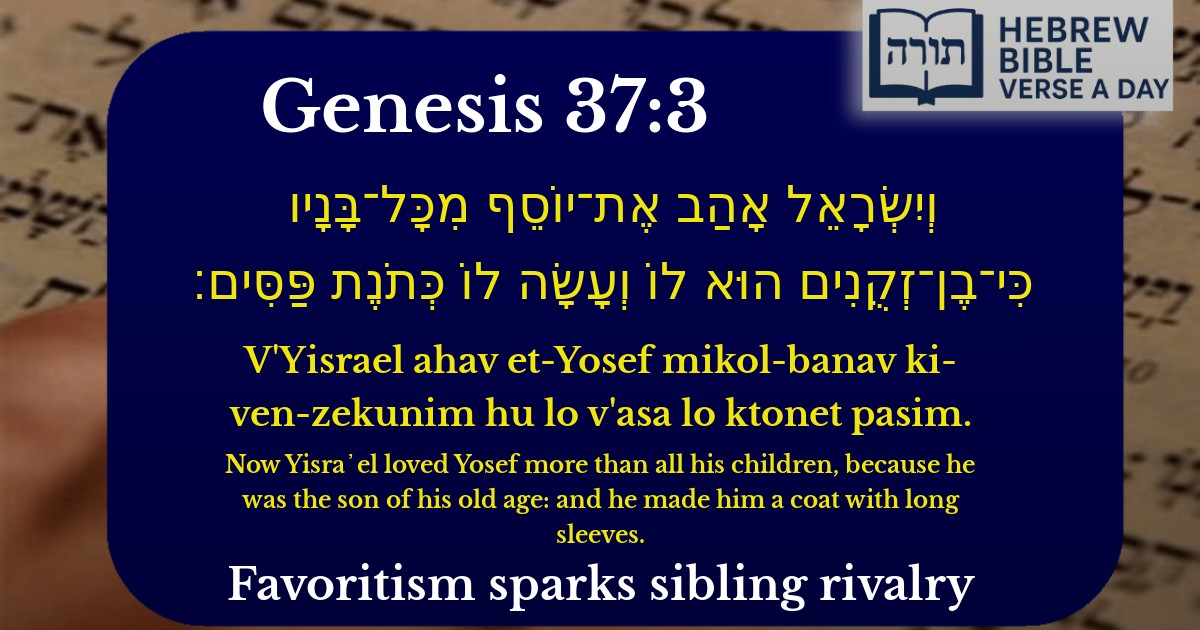Join Our Newsletter To Be Informed When New Videos Are Posted
Join the thousands of fellow Studends who rely on our videos to learn how to read the bible in Hebrew for free!
Hebrew Text
וְיִשְׂרָאֵל אָהַב אֶת־יוֹסֵף מִכָּל־בָּנָיו כִּי־בֶן־זְקֻנִים הוּא לוֹ וְעָשָׂה לוֹ כְּתֹנֶת פַּסִּים׃
English Translation
Now Yisra᾽el loved Yosef more than all his children, because he was the son of his old age: and he made him a coat with long sleeves.
Transliteration
V'Yisrael ahav et-Yosef mikol-banav ki-ven-zekunim hu lo v'asa lo ktonet pasim.
Hebrew Leining Text
וְיִשְׂרָאֵ֗ל אָהַ֤ב אֶת־יוֹסֵף֙ מִכׇּל־בָּנָ֔יו כִּֽי־בֶן־זְקֻנִ֥ים ה֖וּא ל֑וֹ וְעָ֥שָׂה ל֖וֹ כְּתֹ֥נֶת פַּסִּֽים׃
וְיִשְׂרָאֵ֗ל אָהַ֤ב אֶת־יוֹסֵף֙ מִכׇּל־בָּנָ֔יו כִּֽי־בֶן־זְקֻנִ֥ים ה֖וּא ל֑וֹ וְעָ֥שָׂה ל֖וֹ כְּתֹ֥נֶת פַּסִּֽים׃
🎵 Listen to leining
Parasha Commentary
📚 Talmud Citations
This verse is quoted in the Talmud.
📖 Shabbat 10b
The verse is referenced in a discussion about parental favoritism and its consequences, illustrating how Jacob's favoritism towards Joseph led to jealousy among his brothers.
📖 Megillah 16b
The verse is cited in the context of discussing the special garments made for Joseph, symbolizing his unique status among his brothers.


Yaakov's Special Love for Yosef
The verse states that Yaakov loved Yosef more than all his other sons because he was a "ben zekunim" (son of his old age). Rashi explains that this phrase means Yosef was born when Yaakov was already elderly. Additionally, Rashi cites the Midrash (Bereshit Rabbah 84:8) that Yosef was the primary student of Yaakov in his later years, absorbing his father's Torah teachings more than his brothers.
The Significance of the Ketonet Passim
The "ketonet passim" (coat of many colors) that Yaakov made for Yosef is interpreted in several ways by our commentators:
Parental Favoritism and its Consequences
The Talmud (Shabbat 10b) derives from this episode that a parent should not show favoritism among children, as it led to jealousy and strife among the brothers. The Midrash Tanchuma (Vayeshev 4) elaborates that while Yaakov's love was rooted in Yosef's spiritual qualities, the outward display of favoritism through the special garment provoked the brothers' resentment.
Yosef as Yaakov's Spiritual Successor
The Kli Yakar emphasizes that Yaakov saw in Yosef a continuation of his own spiritual legacy. As Yosef was born after Yaakov had already achieved spiritual maturity (unlike the brothers born during his years of struggle with Lavan), he embodied Yaakov's purest Torah values. This explains why Yaakov invested special attention in Yosef's education and development.